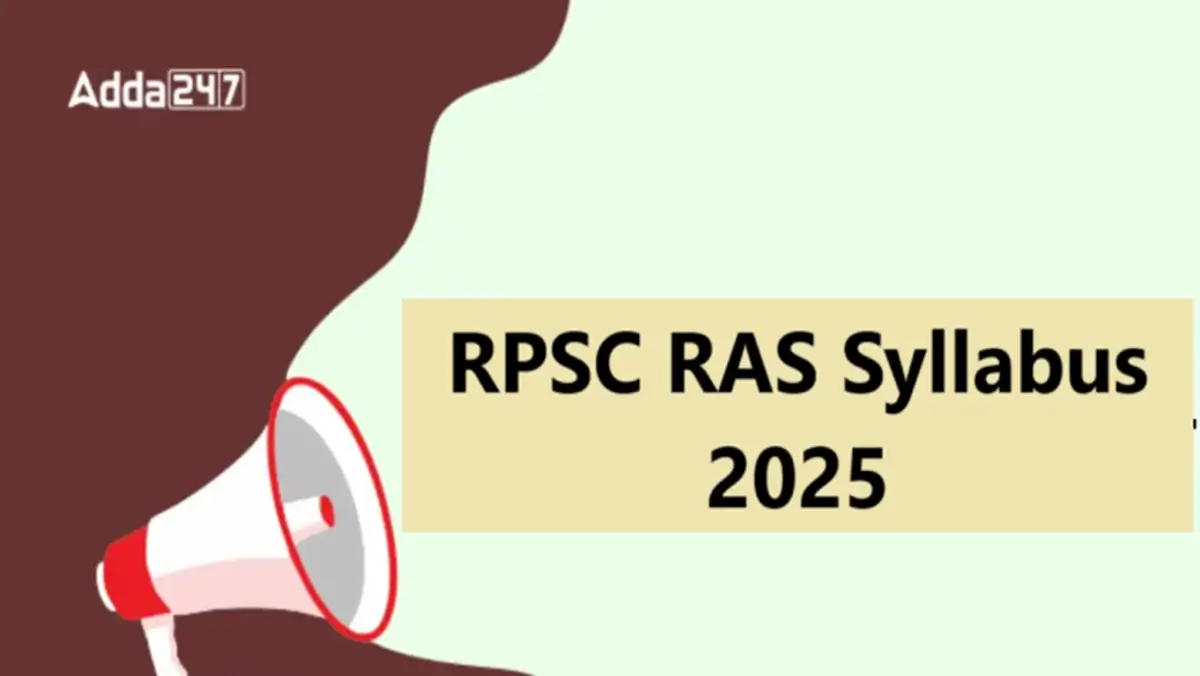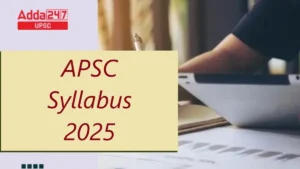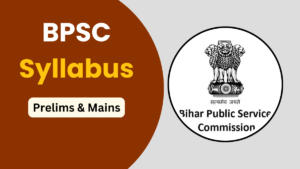Table of Contents
RPSC RAS Exam Syllabus 2025- Overview
Here in the table, we have provided a glimpse of the RPSC RAS Exam 2025. Check the table below to get details in short.
| RPSC RAS Exam 2025 Overview | |
| Recruitment Organization | Rajasthan Public Service Commission (RPSC) |
| Post Name | Various Civil Service Posts, State Services Group A and B Posts |
| RPSC RAS Prelims Exam 2025 | 02 February 2025 |
| Category | Syllabus |
| Status | Released |
| Selection Criteria | 3 Stages, Prelims-Mains- Interview |
| Exam Pattern | Prelims: 150 questions- 200 marks Mains(Descriptive): 4 Papers, 800 questions |
| Duration | Prelims: 3 hours Mains: 3 hours each paper |
| Job Location | Rajasthan |
| Official Website |
rpsc.rajasthan.gov.in.
|
| State PCS Whatsapp Channel for the Latest Update | |
RPSC RAS Exam Pattern 2025
According to the RPSC RAS Notification 2025, the examination consists of three stages: Prelims, Mains and Interview. The Prelims stage is a qualifying exam, and the candidates are selected from the marks obtained from the Mains and Interview
RPSC RAS Prelims Exam Pattern 2025
RPSC RAS Prelims 2025 is qualifying in nature, clearing that stage the candidates are called for the RPSC RAS mains examination. The exam pattern for RPSC RAS Prelims 2025 is outlined in the table below:
- Total marks: 200
- Exam Level: Graduation
- Subject: General Knowledge
Marks obtained in the Prelims exam will not contribute to the merit list.
| RPSC RAS Prelims Exam Pattern 2025 | |||
| Subject | Total Questions | Marks | Time |
| General Knowledge | 150 | 200 | 3 hours |
RPSC RAS Mains Exam Pattern 2025
Below, candidates can refer to the table containing the RPSC RAS Mains Exam Pattern 2025. The RPSC RAS Mains 2025 is a descriptive type exam. Candidates who pass the Prelims will receive an admit card for the Mains examination.
- Exam Type: Descriptive type paper
- Total Papers: 4 compulsory papers
- Exam Level: Graduation
- Structure: Each paper consists of 2 short answer questions, 5 medium answer questions, and 10 long answer questions.
| RPSC RAS Mains Exam Pattern 2025 | ||
| Papers | Marks | Duration |
| Paper 1: General Studies I | 200 marks | 3 hours |
| Paper 2: General Studies II | 200 marks | 3 hours |
| Paper 3: General Studies III | 200 marks | 3 hours |
| Paper 4: General Hindi and General English | 200 marks | 3 hours |
| Total | 800 marks | |
RPSC RAS Syllabus 2025
The Rajasthan Public Service Commission has declared the detailed syllabus for various subjects for the RAS Prelims and Mains Examination. RPSC RAS syllabus provides candidates with a structured approach to prepare for the RAS Exam 2025. The syllabus is arranged by subject and it is helpful for aspirants to plan their studies more effectively. Checking the RAS Syllabus 2025, allows candidates to ensure they cover all key topics and stay focused on their RPSC RAS preparation.
RPSC RAS Prelims Syllabus 2025
Rajasthan Public Service Commission has divided the RAS syllabus into two main categories: General Knowledge and General Science. The General Knowledge syllabus includes History, Culture, Geography, Economy, Polity, and Current Affairs and the General Science syllabus includes a wide range of Physics, Chemistry and Biology. This comprehensive syllabus supports thorough preparation and holistic learning. The important topics in the RPSC RAS Prelims Exam 2025 Syllabus are given below.
History, Art, Culture, Literature, Tradition & Heritage of Rajasthan Syllabus
- Rajasthani Culture, Traditions, and Heritage
- Major Landmarks in the History of Rajasthan
- Freedom Movement, Political Awakening, and Integration
- Local Dialects Fairs, Festivals, Folk Music, and Folk Dances
- Salient features of Architecture – Forts and Monuments Arts, Paintings, and Handicrafts
- Important Works of Rajasthani Literature
- Religious Movements, Saints & Lok Devtas of Rajasthan
- Important Tourist Places. Leading Personalities of Rajasthan
Geography of India RPSC RAS Syllabus
- Indian Geography
- Agriculture and Agro-based Activities
- Minerals – Iron, Manganese, Coal, Oil & Gas, Atomic minerals
- Broad physical features and Major physiographic divisions
- Major Industries and Industrial Development
- Natural Resources
- Environmental Problems and Ecological Issues
- Transportation– major transport corridors
- Geography of Rajasthan
- Broad physical features and Major physiographic divisions
- Natural Resource of Rajasthan- Climate, Natural Vegetation, Forests, Wildlife, and Biodiversity Major irrigation projects
- Mines and Minerals
- Population
- Major Industries and Potential for Industrial
- World Geography
- Broad Physical features
- Environmental and Ecological Issues
- Wildlife and Biodiversity
- International Waterways
- Major Industrial Regions
Indian History RPSC Syllabus
- Ancient & Medieval Period
- Salient Features and Major Landmarks of Ancient and Medieval India Art
- Culture, Literature, and Architecture
- Major Dynasties, Their Administrative System. Socio-Economic Conditions
- Prominent Movements
- Modern Period
- Modern Indian history (from about the middle of the eighteenth century until the present)- significant events, personalities, and issues
- The Freedom Struggle & Indian National Movement- its various stages and important contributors and contributions from different parts of the country
- Social and Religious Reform movements in the 19th and 20th centuries
- Post-independence consolidation and reorganization within the country
Indian Constitution, Political System, and Governance Syllabus
- Indian Political System and Governance
- Nature of Indian State, Democracy in India, Reorganization of States, Coalition Governments, Political Parties, National Integration
- Union and State Executive; Union and State Legislative, Judiciary
- President, Parliament, Supreme Court, Election Commission, Comptroller and Auditor General, Planning Commission, National Development Council, Central Vigilance Commission (CVC), Central Information Commission, Lokpal, National Human Rights Commission (NHRC).
- Local Self-Government & Panchayati Raj
- Public Policy & Rights: National Public Policy as a welfare state, Various Legal Rights and Citizen Charter
Indian Economy & its Aspects RPSC RAS Syllabus
- Basic Concepts of Economics
- Basic Knowledge of Budgeting, Banking, Public Finance, National Income, Growth and Development- Accounting- Concept, Tools, and Uses in Administration, Stock Exchange and Share Market, Fiscal and Monetary Policies, Subsidies, Public Distribution System, e-Commerce
- Inflation- Concept, Impact and Control
- Economic Development & Plannin- 5 Year Plans – Objectives, Strategies, and Achievements
- Major Sectors of Economy- Agriculture, Industry, Service, and Trade- Current Status, Issues & initiatives
- Major Economic Problems and Government Initiatives. Economic Reforms and Liberalization
- Human Resource and Economic Development:- Human Development Index Poverty and Unemployment:- Concept, Types, Causes, Remedies, and Current Flagship Schemes
- Social Justice and Empowerment: Provisions for Weaker Sections
Economy of Rajasthan RAS Syllabus
- A Macro Overview of the Economy
- Major Agricultural, Industrial, and Service Sector Issues. Growth, Development, and Planning
- Infrastructure & Resources
- Major Development Projects
- Programs and Schemes- Government Welfare Schemes for SC/ST/Backward Class/Minorities/Disabled Persons, Destitute, Women, Children, Old Age People, Farmers & Labourers
Political and Administrative System of Rajasthan Syllabus
- Governor
- Chief Minister
- State Assembly
- High Court
- Rajasthan Public Service Commission
- District Administration
- State Human Rights Commission
- Lokayukta
- State Election Commission
- State Information Commission
- Public Policy, Legal Rights, and Citizen Charter
Science & Technology Basics of Everyday Science
- Electronics, Computers, Information, and Communication Technology
- Space Technology including Satellites. Defense Technology. Nanotechnology
- The human body, Food, and Nutrition, Health care
- Environmental and Ecological Changes and their Impacts
- Biodiversity, Biotechnology, and Genetic Engineering
- Agriculture, Horticulture, Forestry, and Animal Husbandry with particular reference to Rajasthan
- Development of Science and Technology in Rajasthan
- Reasoning & Mental Ability Syllabus
Logical Reasoning (Deductive, Inductive, Abductive)
- Analytical Reasoning
- Mental Ability: Number series, Letter series, Odd man out, Coding-Decoding, Problems relating to Relations, Shapes, and their sub-sections
- Basic Numeracy: Elementary knowledge of Mathematical and Statistical Analysis
- Number System
- Order of Magnitude
- Ratio, and Proportion
- Percentage
- Simple and Compound Interest
- Data Analysis (Tables, Bar diagram, Line graph, Pie-chart)
Current Affairs
- Major Current Events and Issues of State (Rajasthan), National and International Importance
- Persons and Places in Recent News
- Games and Sports related Activities
RPSC RAS Mains Syllabus 2025
The RPSC RAS Mains Exam 2025 does not include any Optional Subjects. The RPSC RAS Mains Syllabus is comprised of the following components:
| RPSC RAS Mains Syllabus 2025 | ||
| Paper -1 | General Studies-1 | Unit 1-History Unit 2- Economics Unit 3- Sociology, Management, Business Administration |
| Paper-2 | General Studies-2 | Unit 1-Logical Reasoning, Mental Ability and Basic Numeracy Unit 2- General Science & Technology Unit 3- Earth Science (Geography and Geology) |
| Paper 3 | General Studies-3 | Unit 1- Indian Political System, World Politics and Current Affairs Unit 2- Concepts, Issues, and Dynamics of Public Administrative and Management Unit 3- Sports and Yoga, Behaviour and Law |
| Paper-4 | General Hindi and General English | Grammar and Usage Comprehension, Translation, and Precis Writing Composition & Letter Writing |
Paper-I General Knowledge and General Studies Syllabus
The RPSC RAS Mains Paper-I is divided into three units , each covering distinct subjects essential for the examination. The first section focuses on History, the second section covers Economics, and the third section includes Sociology, Management, Accounting, and Auditing. Thorough preparation in these areas will help candidates perform well in Paper I of the RPSC RAS Mains Exam.
Unit-I History Syllabus
Part A: History, Art, Culture, Literature, Tradition, and Heritage of Rajasthan
- Major landmarks in the History of Rajasthan from Prehistoric times to close of 18th Century, Important dynasties, their administrative and revenue system
- Salient events of the 19th & 20th centuries: Peasant & Tribal Movements. Political Awakening, Freedom Movement, and Integration
- Heritage of Rajasthan: Performing & fine Art, Handicraft and Architecture; Fairs, Festivals, Folk Music and Folk Dance
- Important works of Rajasthani Literature and Dialects of Rajasthan
- Saints, Lok Devtas and eminent personalities of Rajasthan
Part B: Indian History & Culture of Indian Heritage
- Religious Movements and religious philosophy in Ancient and Medieval India
- History of Modern India from the beginning of the 19th Century to 1965 AD: Significant events, personalities, and issues
- Fine Art, Performing Art, Architecture & Literature from Indus Civilization to British Era
- Indian National Movement- Its various stages & streams, important contributors and contributions from different parts of the country
- Post Independence consolidation and reorganization – Accession of princely states and linguistic reorganization of the states
- Socio-religious Reform Movements in the 19th and 20th Century
Part C: History of the Modern World (up to 1950 AD)
- Renaissance and Reformation
- Enlightenment and Industrial Revolution
- Imperialism and Colonialism in Asia and Africa
- Impact of World Wars
Unit-II Economics Syllabus
Part A: Indian Economy
- Major Sectors of Economy: Agriculture, Industry & Service- Current Status, Issues, and Initiatives
- Banking: Concept of Money Supply & High Powered Money. Role and Functions of Central Bank & Commercial Banks, issues of NPA, Financial
- Inclusion. Monetary Policy- Concept, objectives & Instruments
- Public Finance: Tax reforms in India- Direct & Indirect, subsidies- Cash Transfer and other related issues. Recent Fiscal Policy of India
- Recent Trends in Indian Economy: Role of Foreign Capital, MNCs, PDS, FDI, Exim Policy, 12th Finance Commission, Poverty Alleviation Schemes
Part B: World Economy
- Global Economics issues and trends: Role of World Bank, IMF & WTO.
- Concept of Developing, Emerging, and Developed countries.
- India in Global Scenario
Part C: Economy of Rajasthan
- Agriculture, Horticulture, Forestry, Dairy and Animal husbandry with special reference to Rajasthan.
- Industrial Sector- Growth and recent trends. Growth, Development & Planning with special reference to Rajasthan
- Recent developments and issues in the service sector of Rajasthan
- Major Development Projects of Rajasthan- their objectives and impact
- Public-Private Partnership Model for Economic Transformation in Rajasthan
- Demographic Scenario of the State and its Impact on the Rajasthan Economy
Unit-III Sociology, Management, Accounting & Auditing Syllabus
Part A: Sociology
- Development of Sociological Thought in India
- Social Values
- Caste Class & Occupation
- Sanskritization
- Varna, Ashram, Purusharth and Sanskar Vyavastha
- Secularism Issues and Problems of Society
- Tribal community of Rajasthan: Bhil, Mina (Meena), and Garasia
Part B: Management
- Management – Scope, concept, functions of Management – Planning, Organizing, Staffing, Direction, Coordination and Control
- Decision-Making: concept, process, and techniques
- The modern concept of Marketing, Marketing Mix – Product, Price, Place, and Promotion
- Objective, the concept of maximization of wealth, Sources of Finance – Short and Long term, Capital Structure, Cost of Capital
- Concept and Main theories of Leadership and Motivation, Communication, Basics of recruitment, selection, induction, training & development and appraisal system
Part C: Business Administration
- Techniques of analysis of Financial statements, Basics of Working Capital Management, Responsibility and Social Accounting
- Meaning & Objectives of Auditing, Internal Control, Social, Performance, and Efficiency Audit
- Basics of different types of Budgeting, Budgetary control
Paper-II General Knowledge and General Studies Syllabus
RPSC RAS Mains Paper-II has been divided into 4 units: Logical Reasoning, Mental Ability, and Basic Numeracy, General Science and Technology, Earth Science, and Earth Science (Geography and Geology). Read the unit-wise topics from the below sections.
Unit-I Logical Reasoning, Mental Ability, and Basic Numeracy Syllabus
- Logical Reasoning (Deductive, Inductive, Abductive): Statement and Assumptions, Statement and Argument, Statements and Conclusion, Courses of Action
- Analytical Reasoning
- Mental Ability: Number series, Letter series, Odd man out, Coding-Decoding, Problems relating to Relations, Shapes, and their sub-sections
- Basic Numeracy: Elementary knowledge of Mathematical and Statistical Analysis
- Number System, Order of Magnitude, Ratio, Proportion, Percentage, Simple and Compound Interest, Data Analysis (Tables, Bar diagram, Line graph, Pie-chart)
Unit-II General Science & Technology Syllabus
- Motion, laws of motion, work energy and power, rotational motion, simple harmonic motion, gravitation, waves
- Properties of matter, electrostatics, current electricity, moving charge and magnetism
- Ray optics, Nuclear physics, semiconductor devices
- Electromagnetic waves, communication systems, basics of computers, use of information technology in administration, e-governance and e-commerce, contributions of Indian scientists in the development of science
- States of matter, Atomic structure, chemical bonding and molecular structure, equilibrium
- Thermodynamics, kinetic theory of gases, solid state, solutions, electrochemistry, Chemical kinetics
- Characteristic features of life
- Nutrition in organisms
- Principal of inheritance and variation
- Human health and diseases
- Biotechnology and its applications
- Biodiversity and Conservation
- Ecosystems Agriculture, Horticulture, Forestry, Dairy and Animal Husbandry with special reference to Rajasthan
Unit-III Earth Science Syllabus
- Ethics and Human Values: Lesson from the lives and teachings of great leaders, reformers, and administrators
- Role of family, society, and educational Institutions in inculcating values
- Ethical concept and Rin, the concept of Duties, the concept of Good and Virtues
- Ethics in private and public relationships- Behaviour, Moral and Political attitudes of administrators – Philosophical basis of Integrity
- Ethics of Bhagavad Geeta and its Role in Administration
- Gandhian Ethics
- Contribution of Moral Thinkers and Philosophers from India & World
- Psycho-Stress Management
- Case Studies
- Emotional Intelligence – Concepts and their Utilities
Unit-IV Earth Science (Geography & Geology) Syllabus
Part A: World
- Broad Physical Features: Mountains, Plateaus, Plains, Lakes and Glaciers
- Earthquakes and Volcanoes: Types, distribution, and their impact Earth and its Geological time scale
- Current Geopolitical Problems
Part B: India
- Broad Physical Features: Mountains, Plateaus, Plains, Lakes, and Glaciers
- Major Physiographic Divisions of India
- Climate- Origin of Monsoon, Seasonal Climatic conditions, Distribution of rainfall and climatic regions
- Natural Resources: Water, Forest, Soil
- Rocks & Mineral: Types and their uses
- Population: Growth, Distribution and Density, sex ratio, Literacy, urban and Rural Population
Part C: Rajasthan
- Broad Physical Features: Mountains, Plateaus, Plains, Rivers, and Lakes
- Major Physiographic Regions
- Natural Vegetation and Climate
- Livestock, Wildlife, and its Conversation
- Agriculture- Major Crops
- Mineral Resources
- Metallic Minerals- Types, distribution, and Industrial uses and conservation
- Non-Metallic Minerals- Types, distribution, and Industrial uses and their conservation.
- Energy Resources: Conventional and Non-conventional Population and Tribes
Paper-III General Knowledge and General Studies Syllabus
RPSC RAS Mains Paper-III has been divided into three units- Indian Political System, World Politics and Current Affairs, Concepts, Issues and Dynamics of Public Administration and Management, Administrative Ethics, Behaviour, and Law. Below we have provided a detailed syllabus for Paper III.
Unit-I – Indian Political System, World Politics and Current Affairs Syllabus
- Indian Constitution
- Ideological Contents: Institutional Framework- I, Institutional Framework- II, Institutional Framework- III
- Political Dynamics
- State Politics of Rajasthan
- Emerging World Order in the post-Cold War era, USA’s hegemony and its resistance, UN and Regional Organizations,
- International Terrorism, and Environmental Issues
- Foreign Policy of India
- Geo-political and Strategic development in South Asia, South East Asia, and West Asia and their impact on India
- Current Affairs
Unit-II – Concepts, Issues and Dynamics of Public Administration and Management Syllabus
- Administration and management: Meaning, nature, and significance. Its role in developed & developing societies. Evolution of Public Administration as a discipline, New Public Administration, Theories of public administration
- Concepts of power, authority, legitimacy, responsibility, and delegation
- Principles of organization: Hierarchy, Span of control and unity of command
- Functions of management, Corporate governance, and social responsibility
- New dimensions of public management, management of change
- Attitude and foundational values of civil services: integrity, impartiality, and non-partisanship, dedication to public service, the relationship between generalists and specialists
- Legislative & Judicial control over administration: various methods and techniques of legislative & judicial control
- Administrative setup, administrative culture in Rajasthan: Governor, Chief Minister, Council of Ministers, State Secretariat, and Chief Secretary
- District administration: organization, the role of District Collector and Superintendent of Police, Sub-divisional, and Tehsil administration
- Development Administration: Meaning, Scope, and Characteristics
- State Human Rights Commission, State Election Commission, Lokayukta, Rajasthan Public Service Commission, Public Service Guarantee Act, 2011
Unit-III – Administrative Ethics, Behaviour, and Law SyllabusAdministrative Ethics
- Dimensions of Ethics
- Administrative Ethics
- Ethics in Private and Public Relationships
Behavior
- Intelligence
- Personality
- Learning and Motivation
- Meeting Life Changes: Stress
Law
- Concepts of Law
- Contemporary Legal Issues
- Important Land Laws in Rajasthan
- Crimes against Women and Children
| Related Articles | |
| RPSC RAS Salary | RPSC RAS Question Paper |
| RPSC RAS Eligibility Criteria 2025 | RPSC RAS Salary 2025 |



 APSC Syllabus 2025, Download Prelims And...
APSC Syllabus 2025, Download Prelims And...
 Punjab PCS Syllabus 2025, New Prelims an...
Punjab PCS Syllabus 2025, New Prelims an...
 BPSC Syllabus 2025 and Exam Pattern For ...
BPSC Syllabus 2025 and Exam Pattern For ...
